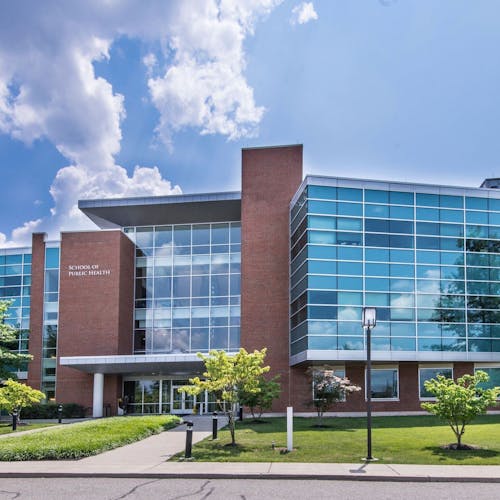AAUP-AFT protests for greater transparency in Professional Development Fund

“No bad checks! No bad checks!” resonated throughout Winants Hall on the College Avenue campus at noon on Sept. 17.
The voices were a collective of undergraduate students, graduate students, faculty members and union staff that were advocating for greater transparency regarding the newly implemented Professional Development Fund.
The demonstration was spearheaded by the American Association of University Professors—American Federation of Teachers (AAUP-AFT) at Rutgers.
“The mission of the Rutgers AAUP-AFT is to ensure the educational quality and academic integrity of Rutgers University by enhancing the professional lives and conditions of employment for those we represent,” according to the AAUP-AFT official website.
“I was happy to speak to a number of teaching assistants and graduate assistants who came to Old Queens today to protest the implementation of the recently-negotiated Professional Development Fund,” said Karen Stubaus, vice president for Academic Affairs and Administration.
The fund was essentially designed to support graduate students with their research, travel and living expenses related to their academic pursuits. It was meant to supplement any other forms of income, in place of the usual salary increase.
Stubaus said the contract provides for four years of the fund, at the following levels: $525,000; $625,000; $725,000 and $825,000.
The proposal for first-year funding was made in the Spring 2015 semester, she said. The awards were made payable on July 1, a few months later.
“Unfortunately, there were some hiccups in this first round of implementation,” Stubaus said. “Award decisions were not made as transparently, nor were awards disbursed as rapidly, as we would have wished.”
There were two points of issues regarding the fund, said Jenna Brager, a teaching assistant and Ph.D candidate in the Department of Women’s and Gender Studies. Firstly, some students received the funding and others did not, however, no one was told how these decisions were made.
“We want more transparency on how these decisions are made and an equitable, efficient system for receiving funding,” she said. “(The fund) was presented as an alternative to receiving guaranteed summer (stipend).”
Secondly, administration has now required that the graduate students’ respective departments be held accountable for the money. Brager noted that this is quite problematic and can potentially lead to the effective bankruptcy of under-funded departments, particularly those in Newark and Camden.
“People are saying 'no bad checks' because a bad check (has essentially been) written,” she said. “I received a check from administration and now the administration is giving an I.O.U. to my department.”
Brager said that she did not hear back from administration regarding her funding until she had already spent a while conducting research in Berlin. Her partial funding came through only in September, by which time her debt had started accruing.
“Paying 25 percent interest on credit cards while waiting for a check from the University that’s three months late is unacceptable,” said David Hughes, a professor in the Department of Anthropology.
He said that the administration should be understanding of its lower wage workers — whom he defines as teaching assistants and graduate assistants. They rely heavily on the timely payments made by the University.
Speaking from his capacity as a tenure-track faculty member, Hughes stands behind and endorses the “teachers and junior scholars” that he trains.
One student at the protest said he had to work 40 hours a week in order to support himself, which precluded him from doing the research he needed in order to keep the funding.
Hughes additionally noted that this protest is actually twinned with another demonstration that will be prospectively held at the Busch Student Center at 9:30 a.m. on Sept. 28. This event will address the need for part-time lecturers to have better contracts.
“Many graduate students become part time lecturers because the TA jobs on which they depended have been converted into these part-time lecturer jobs, which pay much, much less, with no benefits,” he said.
Ideally, they would like to see an end to this conversion, he said. Alternatively, although not as desirable, they would like to guarantee the job security and wages of these part time lecturers.
“We’re working hard with union leadership and with a group of concerned teaching assistants and graduate assistants, to improve implementation of the fund for the next round of proposals,” Stubaus said.



